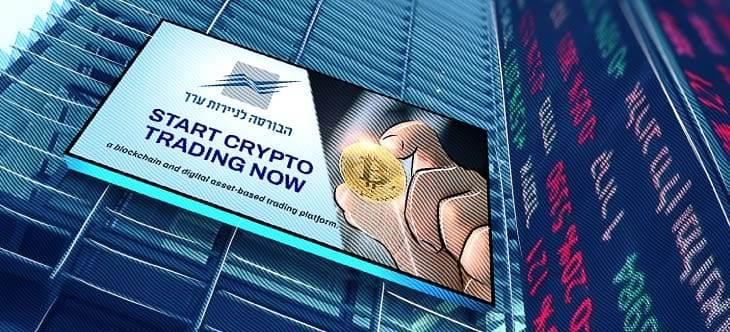Tel Aviv Stock Exchange launches crypto trading

For over a decade, major stock exchanges have consistently disregarded the digital asset market, failing to acknowledge its existence. However, there has been a breakthrough as one player, the Tel Aviv Stock Exchange, has now decided to grant its clients access to this market.
The Tel Aviv Stock Exchange (TASE) is now offering its customers the opportunity to trade cryptocurrencies while taking steps to minimize the risks to investors.

TASE is dead set to become the first stock exchange with a digital asset trading service
In a recent statement, the TASE – which manages Israel's only public platform for securities trading – announced its plan to open new markets and expand its range of instruments and allow non-banking members (NBM) clients to trade cryptocurrencies.
According to local legislation, non-bank financial institutions can provide investment consulting services, carry out brokerage or conversion operations, but they are not allowed to accept deposits from the public like banking institutions.
TASE's proposal to expand its business and enter new markets is currently under public discussion with business representatives and the community. After that, it will be submitted to the TASE Board of Directors for approval.
According to the TASE's proposal, non-bank trading participants must buy and sell cryptocurrencies for their clients through licensed cryptocurrency service providers and custodians authorized to store digital assets.
Procedure explained
To purchase cryptocurrency, a client needs to deposit fiat currency (either in Israeli shekels or foreign currency) into their NBM account. This money will then be transferred from NBM's general account to the account of the trading service provider. Once the customer has bought crypto assets, they will be stored in custody. If the client decides to sell their cryptocurrency, they provide the necessary instructions, and the trading service provider will complete the transaction. After the sale, the provider will credit the amount received in fiat currency to NBМ's account, which will then be transferred to the customer's account.
What is Israel's regulatory stance on this issue?
Following the prolonged crypto market downtrend, Israeli regulators have expressed concerns about the potential risks associated with this industry (as if risks are not present in other industries). They have been warning both individual and institutional investors who participate in digital assets about these risks. Recently, one local regulator has taken steps to monitor the activities of unlicensed cryptocurrency exchanges in the country, while the Bank of Israel has warned local banks and financial companies that issue payment cards about the potential risks of doing business with crypto companies.
All of these indications suggest that the Israeli government is taking a nuanced approach to the digital asset market, neither seeking to ban it like authoritarian China nor making it as open as it is in Venezuela.
Striking a balance
With the signals from regulators in mind, the TASE announced that its proposal appears to be an attempt to find a compromise that will keep both investors and regulators happy. The rights to conduct operations with crypto assets will be delegated to non-bank institutions to satisfy the growing demand for digital assets while minimizing the risks associated with cryptocurrency activity.
At one point, the TASE developed a development strategy that envisaged the exchange's openness to the digital asset market and a desire to create a blockchain-based platform for trading digital assets in the near future. All these plans are officially documented in a separate document.
Key highlights from TASE's development strategy
TASE's top priority is to create a blockchain-based platform for trading digital assets. This is just one of four major strategic goals outlined in a document that also contains a roadmap for the TASE's development over the next five years.
As part of its strategy, the TASE plans to implement innovative technologies and explore the use of DLT as a mechanism to ensure data immutability. The exchange considers the tokenization of assets, the use of smart contracts and aims to introduce a range of crypto-related products and services as promising directions.
What advantages will the market gain?
The TASE believes that modernizing the Israeli capital market to international standards will attract more foreign investments. At the same time, the new mechanism will allow Israeli citizens to trade digital assets through licensed institutions. The new rules will promote the development of the Israeli capital market, encourage innovation and competition while minimizing the risks associated with this activity.
Recommended

